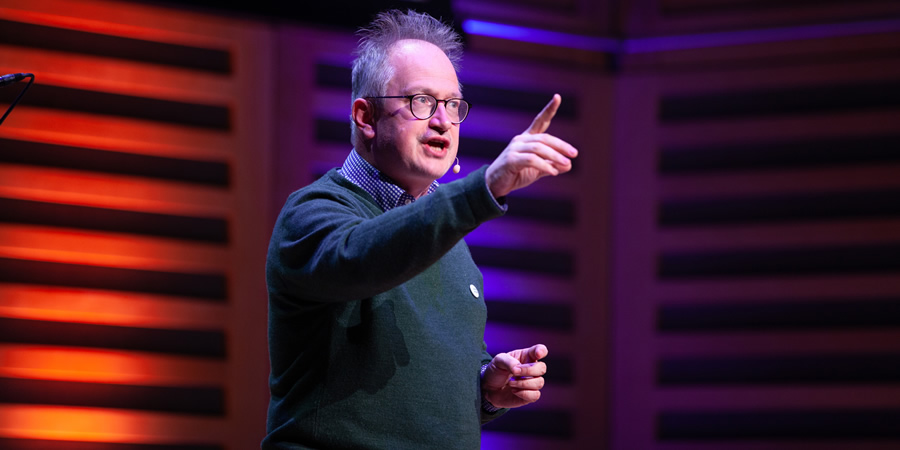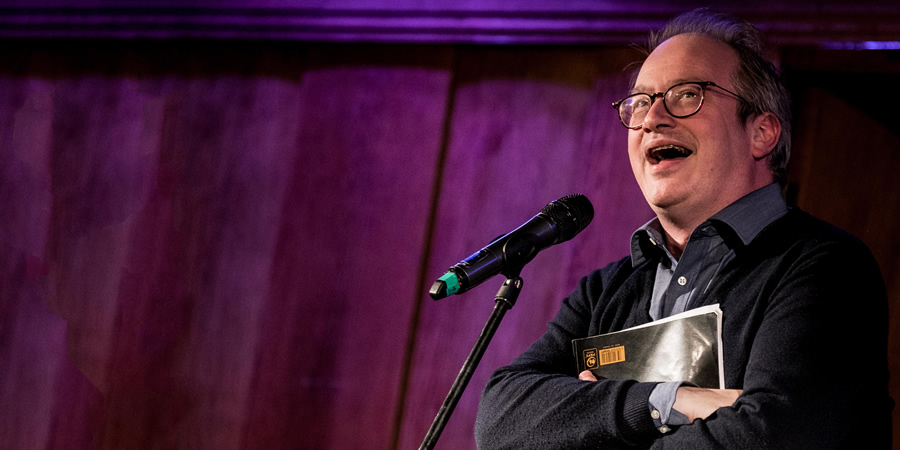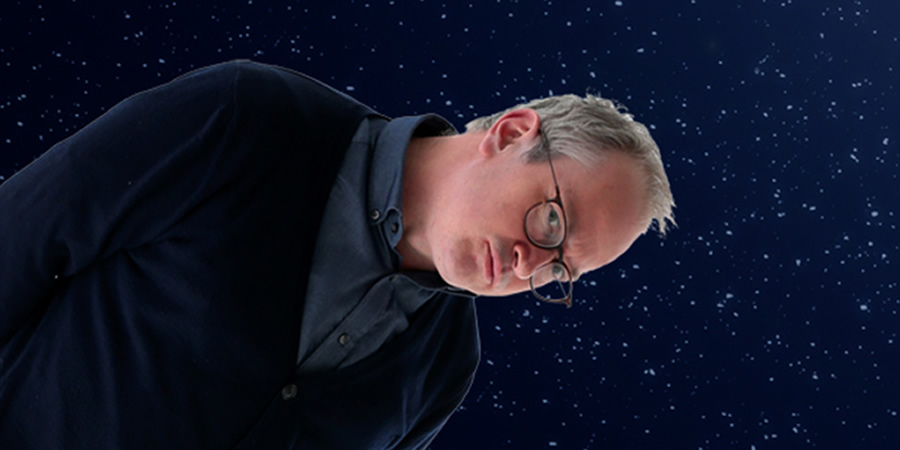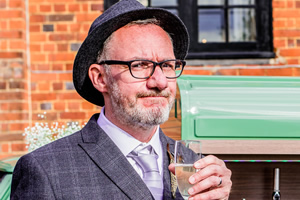Tune-Up, No. 8: Robin Ince on how to get science into stand-up

Do you yearn to be funny about physics? Comical about chemistry? Witty about the later works of Ludwig Wittgenstein? Thankfully that sort of niche subject matter is much more acceptable on stand-up stages these days, and a major catalyst for that shift is Robin Ince.
The Infinite Monkey Cage co-host is now probably best known for his science-based work, despite not being a scientist himself. A brand new radio show is imminent, Robin Ince's Reality Bubble (Tickets), and over the last decade he's helped lots of profs and docs reach wider audiences too, with his annual Nine Lessons events.
There's a special Nine Lessons for Spring double-header at London's King's Place this Easter weekend, with the classic mix of guests - fun thinkers and thoughtful entertainers - including several who, like Ince, regularly perform enlightening comedy.
It's a nice stage to get to. But do you need to start your own event to cross these streams? Or can you slip mind-expanding material into regular gigs? Let's start there.

When you started trying to do science-based material, were you putting it in club sets?
Yeah - it's a really interesting thing to find out, because I remember once I'd done a tour, and then I went to do a comedy club in central London, and I suddenly had that realisation of 'Oh, shit, what can I get away with?' This is a Saturday night club, had real pumping music between all the acts, and I looked at the audience, and I thought, 'Ah, I might have to remember stuff from four or five years ago.'
And then I went on, and I thought, 'No, I'm going to dig my heels in and do what I really want to do.' There were a group of people who it turned out were BNP voters anyway, so they were never going to be my core demographic...
Definitely not.
But the rest of the audience, you know, it was alright. And that was one of those realisations: don't believe that an audience is not [interested]. I think it was a problem on the circuit for many years, probably still is: we make an assumption of what is mainstream and what the audience want.
I remember Reading Festival, doing loads of stuff, probably about CERN or something like that. And the next day I had a meeting with someone from the BBC, I think it was BBC Three, and they went 'Oh you see our demographic won't really understand any of these things.' I said, 'I just played to three thousand drunk teenagers at Reading Festival, and I talked about scientific ideas, including wave particle duality and all of that. And they didn't boo me off. You know, it went really well.'
Of course, they didn't listen, they're not interested in that. But yeah, I did a lot of it on the circuit. And I used to go and do regular Monday, Tuesday new material nights, and try out all these ideas.
So what if someone wanted to do that now, who isn't at the touring stage? How should they go about it?
A young stand-up contacted me via Instagram recently and said, 'What is your advice?' And I just said, 'don't write what you think people will find funny, write what you want to write.' I remember Ben Elton once saying that his starting point was always about finding something funny first, and then turning it - and I don't think that is the right way round.
For me, I first of all go 'that's interesting, how can I make that funny?' So I think as long as you are really enthusiastic and passionate about what you want to turn into comedy, and also, don't fall for the trap that 'if they haven't found it funny three times, it's not funny.' That's bullshit as well. Sometimes it takes 20 or 30 times.
One of the main parts of a show I did about seven or eight years ago, I did seven nights in a row at different clubs trying it out, it just would not work. And then on the eighth night, I don't even remember how I changed it, but something changed and it then became the main bit, the way that I entered the show.

Did you feel like punching the air?
Oh yeah, I actually went into slow-mo freeze frame, Simple Minds playing in the background. To be fair, I don't know what the club circuit's like now, but I think there's quite a variety of places.
I suppose it's about finding the right stages?
But don't always presume. We've all made that mistake. I've been doing this about 30 years now, and the number of times where I've made a presumption on that audience. I remember playing a club in Bristol. And the compere went out and he just did all the rudest stuff, picking on the front row, the young couple, you know, 'have you fingered her yet?' All this kind of stuff. And I thought 'he's just presumed...'
That that's their level?
Yeah. And I went out there and very quickly said 'oh, by the way, there's no questions, you're all fine in the front row' - I was doing a tour show immediately afterwards that night, and I did some of the stuff from that, various different ideas, just playing around with silliness and scientific ideas. I had a really lovely time, and afterwards I said to him, why did you open with that? He said 'it's what they want.'
And was it?
No, it most definitely wasn't. And that night in particular it wasn't, but that sense of threat... because that's what we have to fight all the time; scientific ideas and science stuff, one of the problems you have is your fear of embarrassment.
When you go out there, if you go out on stage and you are predominantly yourself, that's the number one fear, that someone says 'you were shit,' - you were shit, your jokes. So once you've started to get over that, that is a major step forward. There are some clubs that just aren't right [for science stuff]. There used to be clubs that so much tried to get in the hen nights and stag nights.
I remember Jason Byrne once came on a podcast I did with Josie Long, it was a show-and-tell thing, and his show-and-tell was the list of stuff from Jongleurs Comedy Club at the time, about what to expect for your hen or stag. It was basically revving them up to shout at the compere, 'and he'll have a go, and he'll say this...'
Comics worry about quiet audiences too, but I suppose with scientific material, people might just be having their minds blown?
I always remember doing the Meccano Club, near the Market Tavern in North London, watching two comics. One comic got loads of laughs, and the other comic that didn't get many laughs was very interesting.
And afterwards, I can hear people in the bar talking all about how interesting and how much they enjoyed that [second] comic. And no-one I think would have remembered a joke that first person said - he was very immediate, 'I just want a good night out,' you know, the equivalent of an Eagles tribute band. There's nothing really memorable there.
If you want to do comedy about something, it doesn't have to be po faced, but make it in the way that you deal with everything else, you know, play with it, play with those ideas. Then you get this communication, and it means something.
Nine Lessons for Spring is at London's King's Place on Saturday 16th and Sunday 17th April. For details visit cosmicshambles.com
This article is provided for free as part of BCG Pro.
Subscribe now for exclusive features, insight, learning materials, opportunities and other tools for the British comedy industry.




